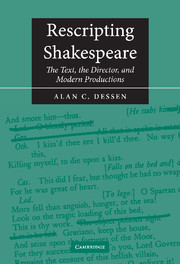Book contents
- Frontmatter
- Contents
- Acknowledgments
- Note on documentation
- List of abbreviations
- 1 “Let it be hid”: price tags, trade-offs, and economies
- 2 Rescripting Shakespeare's contemporaries
- 3 Adjustments and improvements
- 4 Inserting an intermission/interval
- 5 What's in an ending? Rescripting final scenes
- 6 Rescripting stage directions and actions
- 7 Compressing Henry VI
- 8 The tamings of the shrews: rescripting the First Folio
- 9 The editor as rescripter
- Conclusion: what's not here
- Appendix: productions cited
- Notes
- Index
3 - Adjustments and improvements
Published online by Cambridge University Press: 22 September 2009
- Frontmatter
- Contents
- Acknowledgments
- Note on documentation
- List of abbreviations
- 1 “Let it be hid”: price tags, trade-offs, and economies
- 2 Rescripting Shakespeare's contemporaries
- 3 Adjustments and improvements
- 4 Inserting an intermission/interval
- 5 What's in an ending? Rescripting final scenes
- 6 Rescripting stage directions and actions
- 7 Compressing Henry VI
- 8 The tamings of the shrews: rescripting the First Folio
- 9 The editor as rescripter
- Conclusion: what's not here
- Appendix: productions cited
- Notes
- Index
Summary
“But in this changing, what is your intent?”
Love's Labor's Lost, 5.2.137A variety of motives – practical, commercial, and conceptual – lie behind the various forms of rescripting. Streamlining is often a pragmatic choice linked to a lack of resources (a shortage of personnel, a limited theatrical space), a judgment that the targeted playgoers will not stomach the full length of a given script, or merely a director's impatience with the original language and theatrical practice (so “cut to the chase” thinking). Of greater interest are the varied conceptual concerns that lead to rescripting. Like The Fawn, The Revenger's Tragedy, and The Duchess of Malfi, Shakespeare's plays are replete with problematic moments, many of them linked to the material conditions or cultural practices of the 1590s and early 1600s, that have troubled editors, critics, and students. Directors, with their own resources in mind (variable lighting, sets, actresses rather than boy actors to play female roles), therefore regularly adjust or improve the situation in their effort to find a common language with playgoers who lack scholarly glosses. This chapter will deal with several directorial strategies designed to deal with perceived difficulties and anomalies and at times advance specific agendas.
SOLVING PROBLEMS
Over the years scholars have expressed dissatisfaction with some of Shakespeare's narratives as set forth in the Quartos and the Folio and as a result have postulated supposed missing scenes. Directors in turn have factored in additional material to bridge such apparent gaps.
- Type
- Chapter
- Information
- Rescripting ShakespeareThe Text, the Director, and Modern Productions, pp. 64 - 93Publisher: Cambridge University PressPrint publication year: 2002



